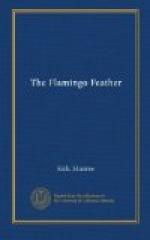Tired as he was, Chitta fell asleep almost instantly; but it was fully an hour after he had done so that a tall Indian rose, without a sound, from the clump of bushes, concealed by which he had all this time been watching the motionless figure, and cautiously approached it. In his hands the tall Indian held a slender cord of twisted deer-hide, in one end of which was a noose.
Without a movement that could arouse the lightest sleeper, he knelt by Chitta’s side, and with great dexterity managed to pass the noose over both his moccasined feet without disturbing his slumber. Drawing it as tightly as he dared, the tall Indian made the other end fast to a sapling, and sat down beside the sleeper to patiently await his awakening.
At length, just as the sun was appearing in the far east, Chitta stirred uneasily, yawned, threw the blanket off from his head, and sat up. As his gaze fell upon the motionless figure beside him he uttered a sort of a gasping cry and sprang to his feet. He had hardly gained them before the noose did its work, and, tripped by it, he fell heavily to the ground. The tall Indian had also sprung to his feet, and now stood over the prostrate form of his victim, with a cruel smile lighting his dark features.
Although wicked, Chitta was no coward, and finding himself thus trapped by an unknown enemy, he coolly asked, as he lay there,
“Who art thou, and what have I done to thee that thou shouldst thus snare me like Pet-che?” (the pigeon).
For answer the tall Indian said, “I will first tell thee who thou art. Thy name is Chitta. Thou wast overthrown but yesterday at the Feast of Ripe Corn by the lad who wears in his hair the To-fa chat-te” (red feather). “Thou art he who set fire to the storehouse of corn. Above all, thou art now, like myself, an outlaw forever from thy people; for know that I am that Seminole called Cat-sha” (the tiger).
At this name Chitta gave a start of surprise, for though he had never before seen this Indian, the name of Cat-sha had been familiar to him from his childhood. It was one used by Indian mothers to frighten their unruly children, and quiet them into obedience, for it belonged to the crudest, boldest, and most dreaded of all the outlawed Seminoles.
When still a youth, Cat-sha had, in a fit of ungovernable anger, struck one of his young companions a blow, from the effects of which he died. For this he was driven from his tribe, and from that day he had been an outcast, whose hand was raised against all men, and who had become famed and dreaded for his deeds of savage cruelty. He had gathered together and become chief of that band of Seminoles of whom Has-se had told Rene, and under his leadership it was rapidly becoming a scourge to all the more peaceful inhabitants of that country. Knowing all this, it is no wonder that Chitta gave a start of surprise not unmixed with alarm when he learned into whose hands he had fallen.




